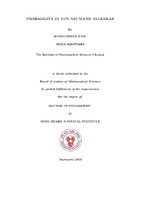- DSpace Home
- →
- IMSc Theses/ Dissertations
- →
- IMSc Theses/ Dissertations
- →
- View Item
JavaScript is disabled for your browser. Some features of this site may not work without it.
| dc.contributor.author | Madhushree Basu | |
| dc.date.accessioned | 2013-10-17T08:59:57Z | |
| dc.date.available | 2013-10-17T08:59:57Z | |
| dc.date.issued | 2013 | |
| dc.date.submitted | 2013 | |
| dc.identifier.uri | https://dspace.imsc.res.in/xmlui/handle/123456789/344 | |
| dc.description.abstract | This thesis is based on a few observations on applications and analogues of certain features of Probability theory in non-commutative W*-probability spaces. A non-commutative W* probability space is a pair (A, φ ) of an algebra and a linear functional on it. Precisely A is a unital *-subalgebra of the algebra of bounded operators on a separable Hilbert space - closed in the weak* topology (known as the σ-weak topology), with φ - a unital, positive, faithful, tracial linear functional on it - continuous with respect to the σ-weak topology; in other words it is a faithful normal tracial state ([Tak02]) on A. Probability theory - the branch of Mathematics that analyzes random phenomena - deals with random variables, which are scalar-valued functions on a non-empty set equipped with a σ-algebra and a probability measure on it. In the case of von Neumann algebras, random variables are replaced by elements of non-commutative probability spaces, that is, bounded linear operators on separable Hilbert spaces. This work is based on observations regarding certain behaviours of such non-commutative random variables. The underlying notion of their probabilistic independence, wherever relevant, is taken to be a well-known non-commutative analogue of the classical independence - known as free independence ([VDN92]). The author defines this notion of independence restricting to the context of von Neumann algebras: This thesis is divided in three chapters. The first two chapters describe certain noncommutative probabilistic models in Free Probability theory. The main tools for the discussions in these two chapters are the moments and cumulants of non-commutative random variables. The last chapter proves an analogue of a minmax theorem - characterizing a certain extremal behaviour of sums of eigenvalues of finite dimensional Hermitian matrices - for a bounded self-adjoint operator with continuous spectra, involving its distribution function - denoted by F(μ) - corresponding to the distribution (μ) of that operator - as the main tool. | en_US |
| dc.publisher.publisher | The Institute of Mathematical Sciences | |
| dc.subject | von Neumann Algebras | en_US |
| dc.subject | Probability | en_US |
| dc.subject | HBNI Th57 | en_US |
| dc.title | Probability in von Neumann Algebras[HBNI Th57] | en_US |
| dc.type.degree | Ph.D | en_US |
| dc.type.institution | HBNI | en_US |
| dc.description.advisor | Sunder, V.S. | |
| dc.description.advisor | Vijay Kodiyalam | |
| dc.description.pages | 71p. | en_US |
| dc.type.mainsub | Mathematics | en_US |
| dc.type.hbnibos | Mathematical Sciences |
Files in this item
This item appears in the following Collection(s)
-
IMSc Theses/ Dissertations
IMSc Theses/ Dissertations
